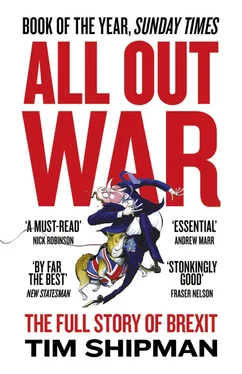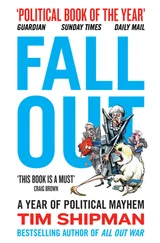Tim Shipman - All Out War - The Full Story of How Brexit Sank Britain’s Political Class
Здесь есть возможность читать онлайн «Tim Shipman - All Out War - The Full Story of How Brexit Sank Britain’s Political Class» — ознакомительный отрывок электронной книги совершенно бесплатно, а после прочтения отрывка купить полную версию. В некоторых случаях можно слушать аудио, скачать через торрент в формате fb2 и присутствует краткое содержание. Жанр: unrecognised, на английском языке. Описание произведения, (предисловие) а так же отзывы посетителей доступны на портале библиотеки ЛибКат.
- Название:All Out War: The Full Story of How Brexit Sank Britain’s Political Class
- Автор:
- Жанр:
- Год:неизвестен
- ISBN:нет данных
- Рейтинг книги:3 / 5. Голосов: 1
-
Избранное:Добавить в избранное
- Отзывы:
-
Ваша оценка:
- 60
- 1
- 2
- 3
- 4
- 5
All Out War: The Full Story of How Brexit Sank Britain’s Political Class: краткое содержание, описание и аннотация
Предлагаем к чтению аннотацию, описание, краткое содержание или предисловие (зависит от того, что написал сам автор книги «All Out War: The Full Story of How Brexit Sank Britain’s Political Class»). Если вы не нашли необходимую информацию о книге — напишите в комментариях, мы постараемся отыскать её.
All Out War: The Full Story of How Brexit Sank Britain’s Political Class — читать онлайн ознакомительный отрывок
Ниже представлен текст книги, разбитый по страницам. Система сохранения места последней прочитанной страницы, позволяет с удобством читать онлайн бесплатно книгу «All Out War: The Full Story of How Brexit Sank Britain’s Political Class», без необходимости каждый раз заново искать на чём Вы остановились. Поставьте закладку, и сможете в любой момент перейти на страницу, на которой закончили чтение.
Интервал:
Закладка:
Others think he should have been prepared to ignore the officials, and was too quickly frightened off by Merkel. She had rejected quotas, but she was never put on the spot in the small hours of a summit about an emergency brake on numbers. Ultimately the renegotiation was a political, not a legal, enterprise, and Cameron could have challenged Merkel to help find a solution. ‘What I genuinely don’t know is whether Merkel in her comments about emergency brakes had really given it any thought as a separate issue,’ a senior minister said, ‘or whether she treated it as the same issue: “quotas and emergency brakes together”. The whole focus of the JCB speech was to shift the debate to benefits. I wonder up to this day whether, if we’d pushed the emergency brake – in terms of numbers, not on benefits – we could have got that. My gut instinct was that the emergency brake was the outer reaches of negotiability.’
After the general election, the Syrian civil war created a fresh migration crisis which put the issue back at the top of the political agenda. In September 2015 Merkel made the rashest decision of her time in power, announcing that refugees were welcome in Germany. The British reaction to Merkel’s extraordinary offer was ‘astonishment’, according to a source who was in touch with the Germans: ‘She would defend it by saying, “What do you expect us to do? We’re not going to shoot people.”’ The result was a vast human tide that prompted several EU countries to reinstate border controls, including Germany. The International Organisation of Migration estimated that one million migrants arrived in Europe in 2015, three to four times as many as the year before, while approaching 4,000 lost their lives while attempting to cross the Mediterranean. Throughout the summer there were almost daily reports from across the Channel in Calais, where migrants gathered seeking passage to Britain. Gradually, but detectably, support for Brexit rose. Andrew Cooper told Cameron the migrant crisis had cost Remain five percentage points.
Merkel was not the only strong woman giving Cameron grief that summer. On 30 August, a week after immigration figures were released showing net migration had hit 330,000, Theresa May wrote a newspaper article announcing that migrants should be banned from entering Britain unless they had a job to go to. She called for EU leaders to tear up the rules on freedom of movement, and even questioned the existence of the Schengen Agreement, saying it had led to the deaths of migrants and placed people at the mercy of people-traffickers. Going much further than Cameron’s renegotiation, she said, ‘When it was first enshrined, free movement meant the freedom to move to a job, not the freedom to cross borders to look for work or claim benefits.’ Five weeks later May put down another marker with an uncompromising speech at the Conservative Party conference which left parts of Downing Street aghast. The speech, written by Nick Timothy, said asylum seekers who entered Britain illegally would be barred from settling permanently in the UK. It led one MP to describe May as ‘Enoch Powell in a dress’.18
May’s intervention was unwelcome, because it was becoming clear that the four-year benefits ban was not going to fly with Britain’s allies (who wanted benefits phasing in much quicker). Europe minister David Lidington approached Llewellyn at the Conservative conference and said, ‘We’re not going to get four years.’ But he added, ‘I am starting to pick up that people are talking about emergency brakes again.’ The negotiators put out feelers. ‘The problem was, at that stage, because we’d spoken so much about migrant benefits, the emergency brake proposal we’d heard from the others and the European Commission was of an emergency brake on welfare, rather than on numbers,’ said Lidington. This new idea sounded good, but it meant watering down the plans outlined in the JCB speech, which were already a poor substitute for a proper limit on the number of new arrivals.
Just before party conference Sajid Javid, the business secretary, also floated an idea in conversation with George Osborne. He suggested free movement should be linked to a country’s GDP, so migrants from richer countries in the EU could travel freely, but those from poorer nations could not. Javid believed something more on immigration was needed, but he was told the idea was ‘not a flier’, and not to put anything in writing to Downing Street in case it leaked. Number 10 banned him from addressing a Eurosceptic fringe meeting at the conference.
The realisation that the offering at the referendum would do nothing meaningful to limit immigrant numbers led to another bout of infighting over the scale of Cameron’s demands. His younger aides – Mats Persson, Ameet Gill, Daniel Korski and Max Chambers – all wanted a bolder gesture than Ivan Rogers and Tom Scholar were prepared to endorse. ‘I can promise you the PM kept coming back to the idea of an emergency brake. That’s what he wanted all the way through,’ one aide said.
Another member of the inner circle said Cameron and Llewellyn later regretted their caution: ‘I know certainly Ed and indeed the PM do look back and think, “We should have probably gone hard and more publicly on the migration.”’ Cameron’s opponents agreed. Daniel Hannan said, ‘I think the huge mistake that he made, tactically and strategically, was to put all his eggs in the baskets of migration and benefits.’
Andrew Cooper, who was constantly polling and focus-grouping each iteration of the migrant plan, warned Cameron, as he was drawing up his formal proposals at the start of November 2015, that the benefits brake would not be enough to neutralise immigration as a referendum issue: ‘It became clear very early on that it was obviously going to be a massive problem. We tested multiple different versions. The conclusion was: all the things that look achievable don’t remotely pass the credibility test with the electorate.’
As Cameron began to finalise his renegotiation demands towards the end of 2015, he was preparing for a referendum that his closest ally George Osborne did not want, by working on a plan to reduce migrant benefits that his chief pollster thought was inadequate because a tougher plan had been rejected as unworkable by Angela Merkel and consequently by Theresa May. And all the while the migration crisis filled television screens, demonstrating the impact of Macmillan’s ‘events’ on politics.
A member of Cameron’s team said, ‘Perhaps the biggest regret of David’s premiership will be not going for the brake back in that speech. In the end, we actually got far-reaching changes to benefits to the surprise of many, even though it contravened every facet of EU law on non-discrimination. The Commission just found a way to bend the rules. But Tom [Scholar] had advised us that any substantial reform on free movement was simply not achievable and that free movement was a holy, inviolable principle. I regret that we trusted Tom too much. Who knows – if we’d gone with our gut, the boss could still be in Number 10 today.’
David Cameron had not yet lost the referendum, but his failure to demand a cap or an emergency brake on migrant numbers left him with a mountain to climb before he had even started. It was a situation the Eurosceptics were straining at the leash to exploit.
2
For Britain
Bellamy’s restaurant in Westminster is a pretty unglamorous place for a revolution to start. Located in 1 Parliament Street, at the slightly decaying end of the parliamentary estate, it is primarily a haunt for MPs’ researchers flirting with their colleagues rather than an arena for discussing the great issues of the time. Yet it was in Bellamy’s that a meeting occurred in 1993 which would help propel Britain from the European Union twenty-three years later.
Читать дальшеИнтервал:
Закладка:
Похожие книги на «All Out War: The Full Story of How Brexit Sank Britain’s Political Class»
Представляем Вашему вниманию похожие книги на «All Out War: The Full Story of How Brexit Sank Britain’s Political Class» списком для выбора. Мы отобрали схожую по названию и смыслу литературу в надежде предоставить читателям больше вариантов отыскать новые, интересные, ещё непрочитанные произведения.
Обсуждение, отзывы о книге «All Out War: The Full Story of How Brexit Sank Britain’s Political Class» и просто собственные мнения читателей. Оставьте ваши комментарии, напишите, что Вы думаете о произведении, его смысле или главных героях. Укажите что конкретно понравилось, а что нет, и почему Вы так считаете.












